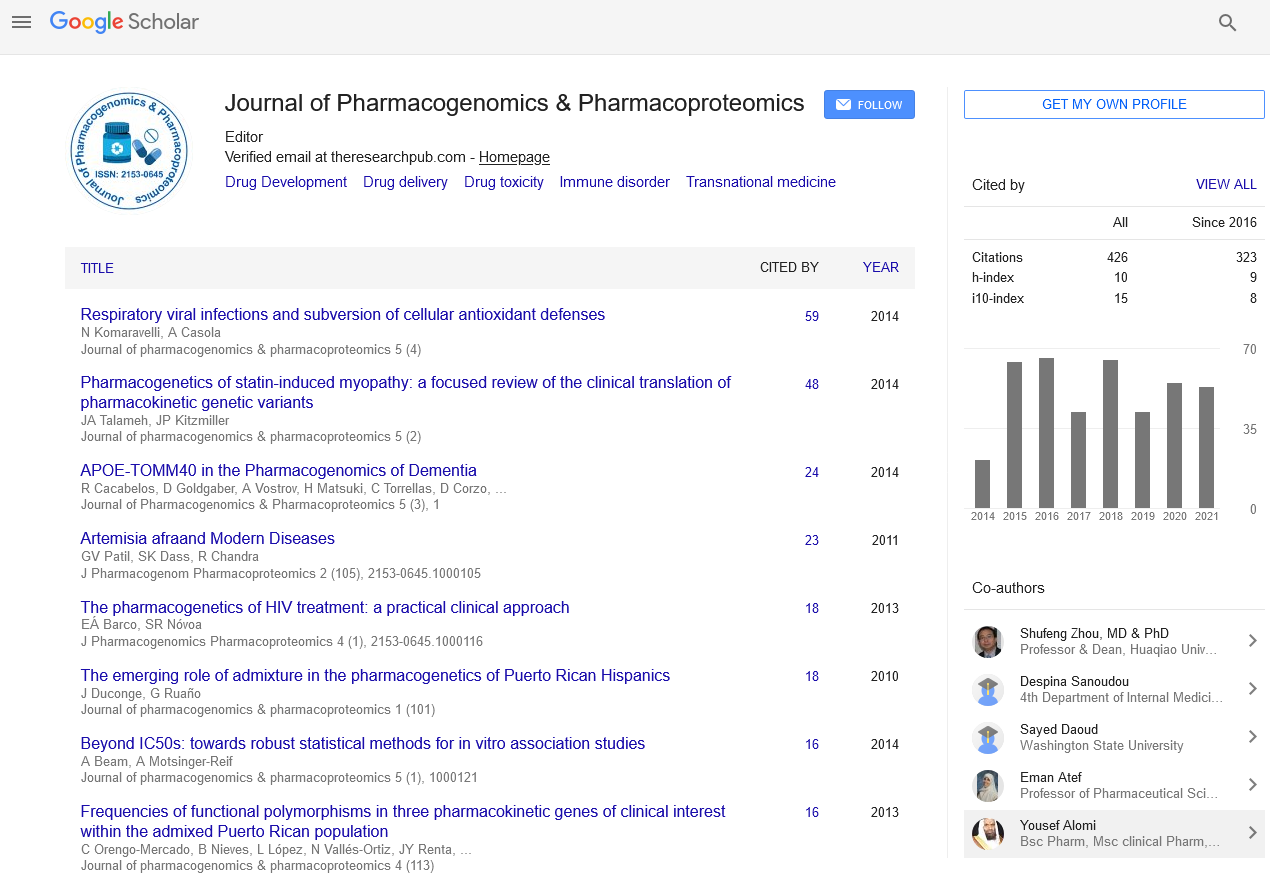Indexed In
- Open J Gate
- Genamics JournalSeek
- Academic Keys
- JournalTOCs
- ResearchBible
- Electronic Journals Library
- RefSeek
- Hamdard University
- EBSCO A-Z
- OCLC- WorldCat
- Proquest Summons
- SWB online catalog
- Virtual Library of Biology (vifabio)
- Publons
- MIAR
- Euro Pub
- Google Scholar
Useful Links
Share This Page
Journal Flyer

Open Access Journals
- Agri and Aquaculture
- Biochemistry
- Bioinformatics & Systems Biology
- Business & Management
- Chemistry
- Clinical Sciences
- Engineering
- Food & Nutrition
- General Science
- Genetics & Molecular Biology
- Immunology & Microbiology
- Medical Sciences
- Neuroscience & Psychology
- Nursing & Health Care
- Pharmaceutical Sciences
T-cell receptor repertoire of insulin-reactive lymphocytes in type 1 diabetes
3rd International Conference on Predictive, Preventive and Personalized Medicine & Molecular Diagnostics
September 01-03, 2015 Valencia, Spain
Constantin Polychronakos
The Research Institute of the McGill Health Centre, Canada
ScientificTracks Abstracts-Workshop: J Pharmacogenomics Pharmacoproteomics
Abstract:
Background: Type 1 diabetes (T1D) is due to the autoimmune destruction of the pancreatic β-cells. Autoantigen specificity is determined by the T-cell receptors (TCRs) of autoreactive lymphocytes but their characteristics are poorly understood. Nextgeneration sequencing now offers methodological possibilities for exploring the vast diversity of the somatically rearranged TCRs for possibilities of personalized diagnosis and intervention. Objective: To define the TCRs reactive to whole proinsulin, the most important T1D autoantigen. Methods: We examined T-cells from the peripheral blood of nine children with T1D and two normal controls, by proliferated in vitro after 12 days of activation with proinsulin and isolated by CFSE dye-dilution flow-sorting. TCRs were amplified from whole RNA by 5�??RACE and amplicons sequenced on the Illumina miSeq with a 250 x 2 protocol. Beta-chain reads were analysed by a paired-end modification of the standard algorithm. Results: Response to proinsulin was highly polyclonal in the T1D patients but much fewer clones were seen in the two controls, where 29% and 80% of all proliferating clones had the same TCR (p=0.018, rank test). Interestingly, 562 out of the 5,446 clones that showed at least 20-fold expansion were �??public�?�, i.e. exactly the same in different subjects. These clones tended to have a higher ratio of expansion (mean 123 vs. 103, p=0.04. Conclusion: TCR clonality of proinsulin specificities appears to distinguish cases from controls and, if confirmed, may be an important predictor of diabetes, and immune-progress biomarker. Definition of the main TCR clones in early pre-diabetes may provide opportunities for antigen-specific immunosuppression.
Biography :
Constantin Polychronakos specialized in Pediatric Endocrinology in Canada after medical studies at Aristotelian University in Greece, and finished his Post-doctoral research training at McGill University in Montreal, where he is now Full Professor in the Department of Paediatrics with cross-appointment in Human Genetics. He is credited with the discovery of the effect of the INS locus in the thymus in type 1 diabetes, with two of the first GWAS for type 1 and type 2 diabetes and one of the first uses of exon capture combined with NGS to elucidate the cause of a rare monogenic form of diabetes.


